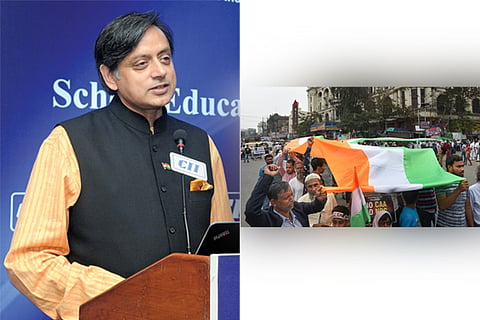

Chennai
After India launched far-reaching economic reforms in 1991, its stature in the world rose steadily. The country was already recognised as a thriving democracy and an example to the world of how to manage diversity in a free and open society. Its enhanced economic clout and the size of its increasingly prosperous market added to its appeal. Its self-branding as the world’s fastest-growing free-market democracy worked; world leaders queuing up to visit New Delhi became a burden for a generation of diplomatic protocol officers.
But in recent months, it has all begun to fall apart. The reason is not hard to find. India’s domestic political environment has turned toxic under Prime Minister Narendra Modi’s Hindu nationalist government, owing to a train of divisive, socially discriminatory policies, accompanied by incendiary political rhetoric bordering on Islamophobia. A series of disastrous economic decisions – notably demonetisation and the botched implementation of a nationwide Goods and Services Tax – put many small entrepreneurs out of business and threw millions of people out of work, further convulsing Indian society. And economic failure has only driven Modi’s BJP to double down on its political agenda, animated by the prejudices of its Hindutva ideology.
In particular, a series of decisions suggests the depth of the alienation, stoked by BJP policies and attitudes, of India’s 180-mn strong Muslim population. In recent years, the BJP has criminalised an Islamic form of divorce, talaq-e-biddat; abolished the autonomy enjoyed by India’s only Muslim-majority state, Jammu and Kashmir; campaigned for and celebrated a Supreme Court judgment awarding the site of a destroyed mosque to Hindus; and amended India’s citizenship laws to give fast-track citizenship only to non-Muslim refugees and migrants from three neighbouring countries.
These actions sparked weeks of protest across the country and have subverted India’s pluralist secularism. And if that wasn’t bad enough, the heavy-handed and brutal response to protests in Delhi and Uttar Pradesh, where 27 Muslim protestors were killed, campuses invaded, and students assaulted, has shaken India’s reputation as a democracy to be admired.
The “Rising India” narrative rested on the economy’s performance and potential, and on India’s success at managing its internal differences democratically and largely peacefully.
Rapid economic growth opened up new opportunities for cooperation with foreign countries: neighbours wanted to take advantage of their proximity, while major powers saw a useful partner worth courting. The contrast with China’s rise as an authoritarian state was implicit. The Indian system, many felt, was not only more attractive, but worked just as well. No longer. Thanks to BJP’s divisive sectarianism, driven by narrow party-political goals, India’s stature in the world has never been lower. The recent developments have embarrassed India’s friends in the neighbouring Muslim countries of Bangladesh and Afghanistan, shaken the confidence of foreign investors, antagonised influential members of the US Congress, and earned the government a chorus of disapproval. Major foreign newspapers, whether on the right (like the Wall Street Journal or the Financial Times) or the left (like the Guardian and the Washington Post) have published critical editorials about India in recent months. The drumbeat of daily reporting and commentaries is relentlessly negative.
At home, even neutral figures known for their habitual reticence on political matters have expressed alarm. Former Foreign Secretary Shivshankar Menon recently described the government’s amendment to the Citizenship Act as a “self-inflicted goal” that has isolated India and resulted in the country being routinely mentioned alongside Pakistan as an intolerant state. The divisive policies of the government, he added, has given our adversaries “platforms to attack us” and left India with “no international support apart from a section of the Indian diaspora and some extreme right Members of the European Parliament.”
Several world leaders, and chiefs of United Nations agencies on human rights and refugees, have criticised the government’s recent moves. For the first time in over 40 years, Kashmir was discussed in the UN Security Council. The bipartisan consensus on strong bilateral relations that has existed in the US for 25 years, irrespective of the government in Delhi or Washington, has been broken.
What the world thinks matters more than ever before, not least because India is far more dependent on external trade and investment. Foreign investment requires trust and faith in the future, which is fast eroding. The world increasingly sees India as an intolerant, narrow-minded country. Its credit ratings have been downgraded. Seven countries have issued travel warnings.
The Indian government shows little sign of waking up to the consequences of its domestic policies. It seems to assume that a country of 1.3 bn with the world’s fifth-largest economy, a member of the G20 and the BRICS, cannot be ignored. It consoles itself that its actions still garner popular support in India. But an India that is perceived as bigoted, with a government that, intoxicated by intolerant majoritarianism, is wilfully driving sectarian wedges between its people, can forget about the global embrace on which its future depends.
Shashi Tharoor, a former UN undersecretary-general and former Minister of State for External Affairs and Minister of State for HRD, is an MP for the Indian National Congress. He is the author of Pax Indica: India and the World of the 21st Century.
Visit news.dtnext.in to explore our interactive epaper!
Download the DT Next app for more exciting features!
Click here for iOS
Click here for Android